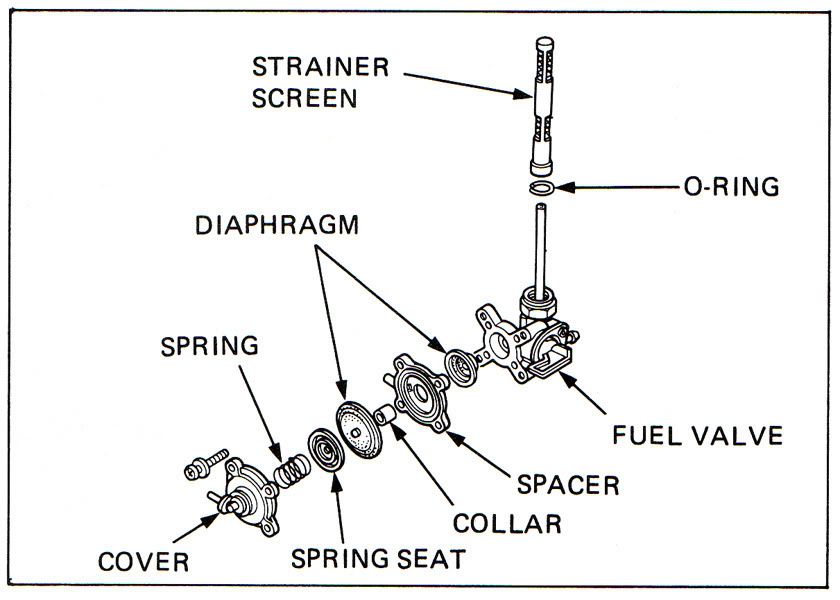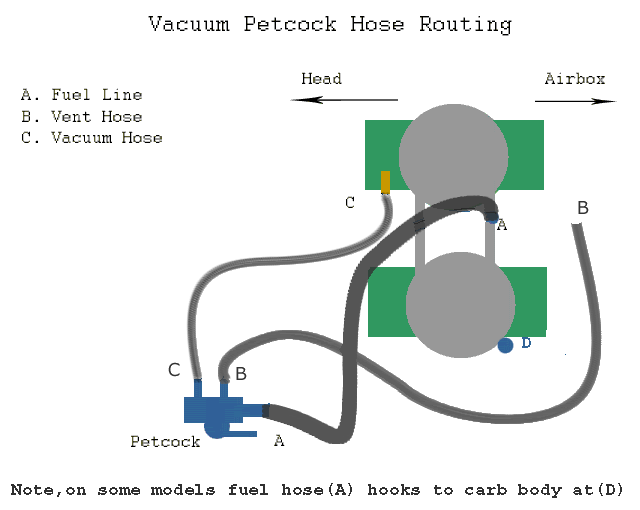Petcocks
Contents
*COPIED TO www.cx500wiki.com
Petcocks:
The petcocks on our bikes seem to be one of the most troublesome areas that people encounter. I would put it in the top five with carbs, stators, cam chains, brakes, and then petcocks. Why does something so seemly simple cause all of these issues? The petcock's function is only to stop the flow of fuel from the tank when the engine is stopped, or the valve is turned to off. A additional duty is to provide a "Reserve" position that allows for fuel to remain in the tank and be used when the normal setting has used up it's supply.
There are two different types of petcocks that are used on our bikes, a normal type and a vacuum actuated style. For the most part, they share similar features and general design. The normal and vacuum both used a "straw" extending up into the tank from the petcock to allow fuel to flow into the carbs when they are set to the ON position. And the OFF position, blocks fuel from flowing thru the petcock completely. The RESERVE position opens a channel at the base of the petcock and fuel tank to allow the last bit of fuel in the tank to flow out.
This is accomplished by three channels terminating under the selector disk and handle. Inside the petcock is a rubber disk with four holes. One is used for a locating hole, one leads to the petcock outflow fitting, another to the reserve port inside the tank, and the other to the top of the straw. The back of the selector has a recess cast into it. As the handle is rotated, this recess aligns with various holes to provide for the functions. There are slight ridges around the perimeter of the holes to better seal off the ports from the selector back.
Resized to 47% (was 840 x 600) - Click image to enlarge 
The vacuum actuated petcock has these same features, but adds a vacuum diaphragm connected to the right carb. A spring holds a plug in the fuel passage until the diaphragm attached to the plug draws it away. Vacuum from a cranking or running engine provides the vacuum needed for this action. It can also be done by lightly sucking on the hose connected to the most forward fitting on the petcock. If the diaphragm is perforated or damaged, the fuel will not flow, irregardless of the position of the selector pointer. Rebuild kits are available from Honda for these petcocks if needed.
Many have disabled the vacuum function by reversing the spring inside the petcock. I have not and prefer to have the vacuum shutoff operative. The reasons are that if the bike is dropped or laid down, if the engine stops, the fuel stops. The second reason is that I always turn off my petcocks on non-vacuum petcocks bikes to prevent fuel from leaking into the engine and over the floor if a float needle becomes stuck.
So, what goes wrong? In the regular petcock, either the rubber disk has deteriorated, or residual fuel left in the tank for years has hardened inside the petcock body. I have experienced both conditions. The most common is the disk becoming brittle, or cracking. Repair can be easy or more involved, depending on the petcock encountered. In any case, the rivets holding the selector retainer need to be drilled. I would advise only drilling the mushroom top and leaving the stems on the petcock for locating pins. The retainer will pop off along with a wave washer and maybe a thin O ring. The selector handle comes away and the rubber disk is exposed.
Pop the disk out and examine for cracking or missing chunks. In a majority of the cases, the disk can simply be turned over and the back side used for the sealing surface. If there are any thru cracks or extreme brittleness, there are after market replacements available on E-bay. Honda does not supply this disk to my knowledge. OK, flip it over, add some grease that isn't washed away with fuel, return the wave washer, and O ring. The wave washer provides the spring action to the selector handle. It presses the handle to the rubber disk when assembled. So, it is important to have, and in some cases, I have reformed the washer to provide more tension against the selector.
by Blue Fox
Link to Vacuum actuated petcock rebuild
Here is a picture compliments of Allan showing how the vacuum petcock hooks up. Thanks, Allan
The 2 brass ports on the inside of the carbs are the float bowl vents and do not connect to anything and are not covered.
Vacuum hose routing is shown in this diagram. Hose B is routed to the bottom of the bike and does not connect to anything.
Resized to 55% (was 640 x 510) - Click image to enlarge  Thank you to forum member Blindstitch for this image.
File:Vacuum
Thank you to forum member Blindstitch for this image.
File:Vacuum
Here is a alternative for the Turbo's petcock:
Fuel Petcock Replacement CX500Turbo: The dual outlet petcock with 1/4" npt threads is part #3110-D-AH, and the adapter nut to fit the 18mm tank threads to 1/4"npt petcock threads is part #A2003C. Pingel 888-474-6435 [powerflo_application_chart.htm]
This site is backed by Number 85, who provide the hosting. If you need a website done, get in touch with them.
